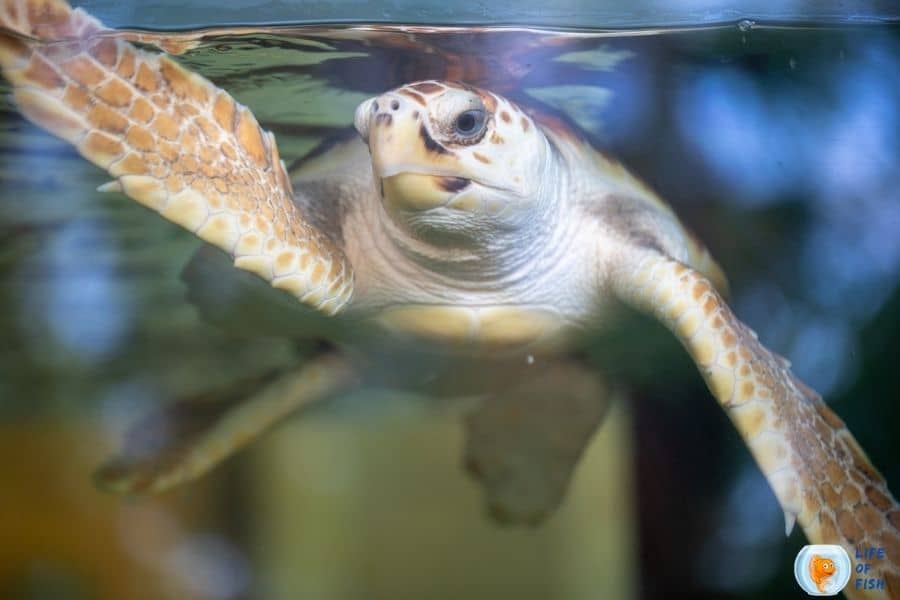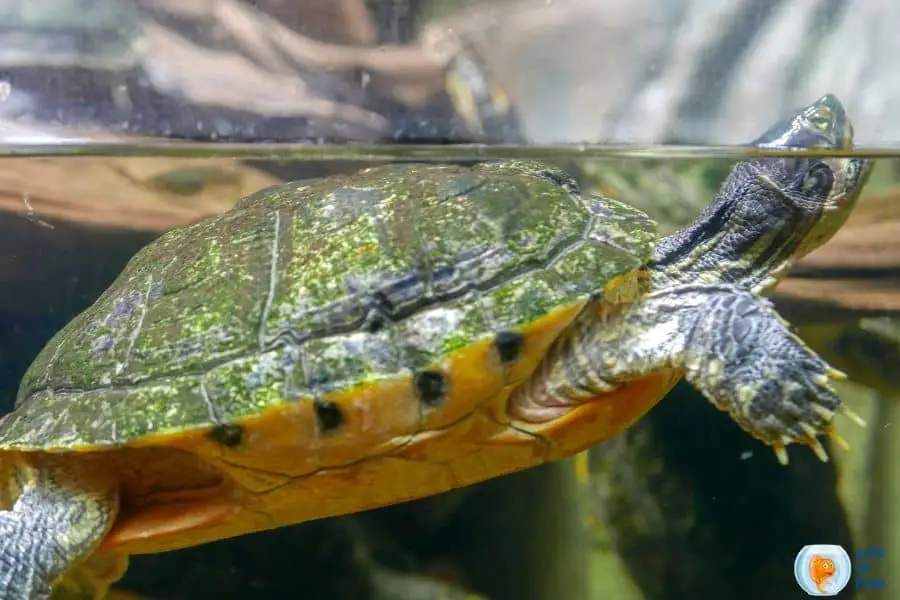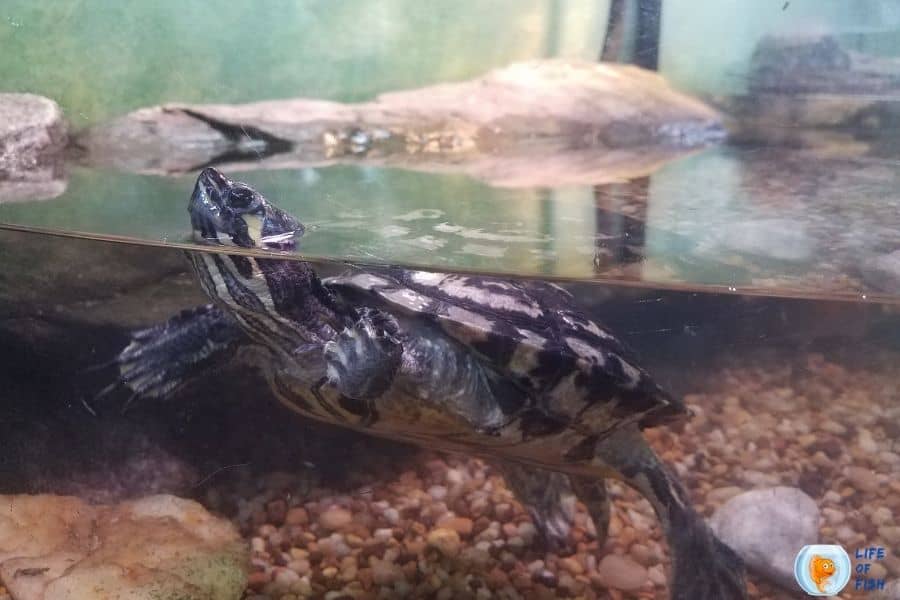When keeping turtles in your tank, there can be times you will have to use glue to fix things together. When gluing down decorations, you don’t want it to affect your turtles’ health. But is hot glue toxic to turtles? The answer is no, but you should always know where the glue is placed.
Generally, you will have to use glue in your turtle tank in two circumstances.
- To repair things in the turtle tank
- To repair damaged turtle shells
You can not use just about any glue for both purposes. If you repaired your turtle tank with the wrong type of glue, it could harm your turtles’ health. On the other hand, turtle shells can only be repaired with special materials and not regular glue.
So let’s find out if hot glue is toxic to turtles in both cases.

Uses of glue in turtle tanks
Jump To
As we mentioned above, there are two cases where glue is employed in the turtle tank.
To repair things in the turtle tank
This includes fixing decorations in the tank, gluing decorations together, fixing equipment in the tank, and even gluing down the substrate.
To repair damaged turtle shells
If your turtle is hit by a car or attacked by a dog or wild animal, it can break the shell.
In this case, you must repair the shell to save the poor thing. Most minor damages heal by themselves, but sometimes the shell can be shattered.
Even though it’s rare for your turtle to break its shell, it will most likely happen at some point in time. And you will have to rush it to the vet or do at least some kind of temporary fix.
In this case, you may have to use glue on your turtle shell.
Repairing things in the turtle tank
Is glue harmful to turtles when used in the tank?
Glue can be harmful if it has toxic substances that leech even after curing.
For example, solvent-based adhesive for tiles is dangerous because the solvents may seep into the water after it is cured.
Therefore, you should only use glue that becomes inert once cured. If you use inert glue, it will be totally safe for turtles in the tank.
Is hot glue toxic to turtles when used in the tank?
Hot glue is not toxic to turtles once it is cured.
Hot glue is basically a form of plastic. So the chemicals used in the hot glue are safe for turtles in the tank.
However, there is one thing you have to be careful about. You have to ensure that the glue does not drip into the water. If it drops into the water, you will have to remove it immediately because the hot glue will cause damage to turtles before curing.
If you use hot glue to fix decorations, equipment, and such in the turtle tank, ensure the glue is completely dried before you put it in the tank. The fumes are not harmful to the turtles, but make sure they are not exposed.
Hot glue requires 24 hours to dissipate the fumes and completely cure. So make sure everything is dry and safe before placing it inside the tank.

What glue is safe for turtle tanks?
Generally, any glue safe for aquarium use is safe for turtle tanks.
However, please remember that the adhesives may vary in chemical components depending on the manufacturer. Therefore, you should always check with the manufacturer before using it in your turtle tank.
Some aquarium safe glue types are,
Epoxy
This is a common type of glue used in the turtle tank. It can be used to repair turtle shells and for basically anything in the tank.
It is safe to use with turtles due to its chemical inertness. In fact, this is one of the best glues you can use in your turtle tank.
Superglue
This is also safe to use with turtles. You can safely apply super glue on turtle’s shell or any other tank decorations.
Just make sure the shell is not wholly “limp” before using the glue. Super glue can bond right away, so they may get stuck together accidentally if they are not strong enough.
However, super glue is known to degrade over time. So if you use it on your turtle tank, make sure you check on it every now and then.
Don’t do it in the tank if you have to reapply the glue. You should remove the sick part and bond it out.
Aquarium safe silicon
Silicon is another popular type of glue used in the turtle tank.
It can hold up well on most tank decorations. You can use silicon to bond everything down in the turtle tank.
To apply it, you should spread a small amount on both surfaces and let it dry before you put them together. Silicon is very safe and will not cause any issue to your turtles if they ingest it.
As a word of caution, be careful about the type of silicon you are using. Some types of silicon may cause impaction for turtles if they ingest it. So always check with the manufacturer before you use a particular brand.
Repairing damaged turtle shells
Is glue harmful to turtles when used to repair the shell?
Glue is a quick and efficient way to repair turtle shells. But, only certain types of glue are safe for turtle shells.
As mentioned earlier, you should only use glue that becomes inert once cured. Ensure the turtle shell is not limp or completely damaged before you bond it with the glue.
Also, make sure that there are no glue residues around it after you apply the glue. Residues may cause the glue to be harmful to turtles if they ingest it.
Is hot glue toxic to turtles when used to repair the shell?
Hot glue is hot and may have harmful substances that are used to produce it. These can harm your turtle if they get exposed to it.
There is no difference between hot and cold glue for a turtle as far as toxicity is concerned. The only difference is hot glue will fix the shell right away but may cause damages to the turtle if they are caught in between.
So, as a general rule, you should not use hot glue to repair turtle shells.
What glue is safe for turtles?
In the first attempted turtle shell repairing methods done by veterinarians, they used super glue and epoxy glues.
However, these attempts had little to no success as the turtle wasn’t treated for any infection. Sealing the shell without treating the wound can cause internal infections and may cause the turtle’s death.
Therefore, gluing alone with superglue, epoxy glue, or fiberglass is no longer recommended for shell repairs.
However, these methods have proven that this glue is safe for repairing turtles. Still, veterinarians and wildlife rehabilitators use the medical version of super glue (cyanoacrylate gel) or epoxy to repair shells.

How to repair turtle shells?
Repairing turtle shells is not an easy task. So, if you don’t have any experience and tools needed for this job, we advise you not to try it at home.
If you can go to a veterinary, please take your pet ASAP. For beginners, it is best to call wildlife rehabilitators and wildlife centers. They may send someone over for a free consultation.
If you must do it yourself, use a scalpel for precise cuts and a suture needle for fine stitching. Remember to disinfect all tools before and after use.
You will need:
- Cyanoacrylate gel/medical superglue (can be found at any veterinary)
- Suture needle (can be bought online or at some medical stores)
- Scalpel (can be found at any medical store)
- Forceps (can be found in most household tools).
Steps to repair turtle shell with glue:
- Wash your hands and the turtle before you start repairing its shell.
- Use a scalpel to bevel the edges of the cut.
- Use forceps and squeeze the turtle’s body to flatten its shell and expose the edges of the cut.
- Clean the wound if there is any dirty residue on the part.
- Apply some medical superglue under the edges of the cut. This will increase wound strength and prevent infection.
- Use a suture needle to stitch the edges of the cut tightly together. If you have an assistant, have them hold the turtle firmly with a towel.
- Apply and spread some super glue over the suture needle and allow it to dry completely. This prevents leakage of the wound due to the force of muscle contraction.
Even after following these steps, you should go to your vet as he can start a course of antibiotics to prevent infection.
Otherwise, your pet may get infected with a dangerous condition called sepsis or septicemia. He can further examine your turtle for any signs of paralysis or other severe conditions.
For severe damage, you must find an expert as it requires the rebuilding of the patches using epoxy, fiberglass, or similar materials.
However, this is a complicated process and can cause permanent damage to the turtle if done wrong.
Related questions
Is Gorilla glue toxic to turtles?
Gorilla glue can be toxic to turtles before it completely cures. However, according to the company, gorilla glue is 100% safe for aquarium use if you let it cure for 5 to 7 days before putting it in your tank.
Is silicone safe for aquarium turtles?
If the silicone sealant you are using is safe for aquarium use, then yes. But if it is not, don’t use it around your turtles or any other living being at all.
Is hot glue safe for reptiles?
Hot glue is safe for reptiles as long as you let it cure for about 24 hours before you use it. However, we do not recommend using hot glue as a permanent adhesive for turtle shells. You can use the regular type of super glue or epoxy instead.
Is a suture needle a vital part of turtle shell repair?
No. It is not necessary to use a suture needle to repair turtle shells. However, you should use one if you have no experience in shell repairs and if it is a deep cut.
Conclusion
Hot glue is not toxic to turtles if used to repair decorations and other tank materials. Still, the glued object must remain outside the tank for about 24 hours to cure completely.
Hot glue is not recommended for turtle shell repairs as it may further damage the wound because of the heat and harmful substances it releases.
Cyanoacrylate glue is the best adhesive choice for turtle shell repairs as it closes up the cut and binds the tissue together.
Read Next : Is Krazy Glue Safe For Aquariums ? | A Crazy Answer For You | Is Epoxy Glue Safe For Aquariums ? (2 Part Epoxy Aquarium Safe) Is Hot Glue Aquarium Safe? 12 Secrets Only A Handful Of People Know
